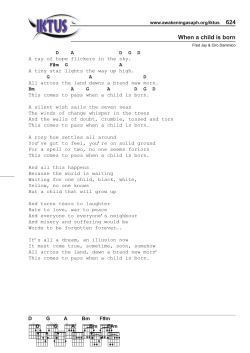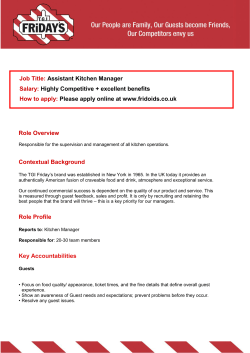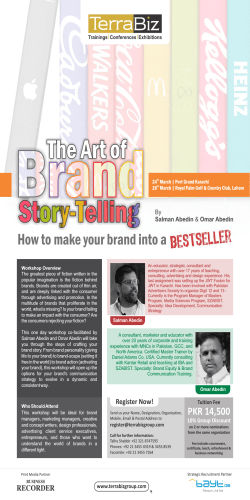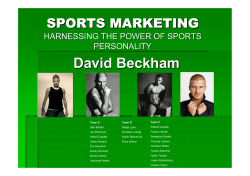
What Is Personal Branding? Part One: Introduction: The Personal Branding Phenomenon
Introduction: The Personal Branding Phenomenon Part One: What Is Personal Branding? CHAPTER 1 Why Build a Personal Brand? or, How to Have Your Competitors Working for You in Five Years You already know it’s a different world—one in which 40-year job security is a distant memory. These days, there’s no loyalty in corporations; you’re as apt to be laid off at the first economic hiccup as you are to be promoted. That’s probably one of the reasons you struck out on your own and started a business. And now, whether it’s just you or you have a small office and a few employees, here’s a new question: How do you create your own security? Before you answer that, answer this: How many people actually know you, as opposed to knowing your reputation? Whether you’re a dentist or a caterer, a freelance writer or a clothing designer, odds are most of the people in your professional world barely know you, the person, at all. They have expectations, and know your skills, your quirks and your résumé. But what percentage of all those people—clients, vendors, prospects, industry contacts and colleagues—have you actually shared drinks with? Had dinner with? Talked about something besides work with? Twenty percent? Ten percent? The point is, outside your immediate circle of friends and family, people know you primarily by your personality, reputation and past performance. In a sense, they know you by your Personal Brand. Now, how do you create your own security? You develop a powerful Personal Brand that influences how potential clients, employees and decision-makers perceive you. Once you do, your Personal Brand will transform the marketing and growth of your business. What Is a Personal Brand? Your Personal Brand is the powerful, clear, positive idea that comes to mind whenever other people think of you. It’s what you stand for—the values, abilities and actions that others associate with you. It’s a professional alter 11 The Brand Called You ego designed for the purpose of influencing how others perceive you, and turning that perception into opportunity. It does this by telling your audience three things: Who you are What you do What makes you different, or how you create value for your target market There are probably many professional contacts who already hold a high opinion of you based on these qualities, and you’ve never tried to make them feel that way. So, imagine the benefit of consciously crafting your Personal Brand to powerfully convey your value to people you want to work with, and who can influence others to work with you. Personal Branding help you do like the song says: “Ac-centuate the Positive.” What a Personal Brand Does A Personal Brand is all about influence. It influences how the people in your target market perceive you. If you’ve done your homework and know the characteristics that those people find valuable, you’ll create perceptions that in turn create a sense of comfort and confidence in talking to you about doing business. To be effective, your Personal Brand must evoke three basic perceptions in the minds of your target market: 1. You are different. Differentiation—the ability to be seen as new and orig- inal—is the most important aspect of Personal Branding. If you can’t be seen as different, you’ll be seen as a follower; that makes capturing “market share” much more difficult. 2. You are superior. Your brand must encourage the belief that you are among the best at what you do in some way—faster, providing better service, having the latest technology, and so on. Being seen as a leader in your field is critical to gaining the confidence of people who don’t know you personally. 3. You are authentic. Great Personal Brands are spin-free zones. Your brand must be built on the truth of who you are, what your strength is, and what you love about your work—and it must communicate this to your market. Today’s savvy consumer can smell shallow hype like a hound smells a fox. 12 Why Build a Personal Brand? A Personal Brand Is a Promise Your Personal Brand tells prospects what they can expect when they deal with you, which is why it’s so powerful. It’s an implied covenant between a service provider and a client; it’s a promise that makes the client believe, “When I buy this, I will be getting that.” You see it all the time in consumer products from cars to computers. People buy because a brand makes them feel a certain way; their choices are rarely rational. But the brands create expectations, and if those expectations are met, people buy again. That’s “brand loyalty.” If the brand doesn’t live up to expectations, buyers go somewhere else. A Personal Brand works the same way. Every minute of every day, it broadcasts information about your character, abilities and performance. It creates expectations in the minds of others of what they’ll get when they work with you. If your brand is sending out the right message, telling prospects they will absolutely get what they’re looking for when they work with you, they’ll beat down your door and burn up your phone lines. You can see the power of a Personal Brand’s promise in the success of Charles Schwab. You’ll probably never work directly with Schwab, but his Personal Brand makes us a promise: When we invest using his company, we’ll be treated like we’re wealthy. Walt Disney’s brand reassures us about the experience we’ll have when visiting his parks, watching his movies, or buying his products. Some of Today’s Greatest Personal Brands How do you know a person’s brand? If, when you think of him or her, a single idea blocks out everything else, that’s a Personal Brand. That’s what you’re shooting for in your own branding. Some of today’s best examples: Michael Jordan – The Greatest Basketball Player of All Time Jimmy Buffett – Purveyor of the Margaritaville Lifestyle Walter Cronkite – The Most Trusted Newsman in the Nation Madonna – The Genius at Self-Reinvention and Self-Promotion Tom Hanks – The Everyman of the Big Screen Bob Vila – The Home-Renovation King Colin Powell – Noble Leader and Statesman 13 The Brand Called You Branding Is as Old as Humanity The term “Personal Branding” is a modern invention, but the phenomenon of people instantly labeling each other based on reputation and behavior is as old as human interaction. Even within primitive societies, individuals judged each other based on quick impressions, and decided whom to trust based on unreliable emotional contexts. Today, we all make judgments about other people with only surface information in hand. Consider a cocktail party. You meet someone and in seconds you’ve made up your mind about his education, his wealth, and his manners. If you get to know him later, you may change your mind about some things, but those quick-flash perceptions will be hard to shake. You’ve just encountered his personal image, the DNA of his Personal Brand. So, Personal Branding is a natural, organic part of human society. The difference today is, we’ve learned the secrets that let you determine how others perceive you. What we’re basically saying is: Define your brand, or your brand will define you. A Personal Image Is Not a Personal Brand Everyone has a personal image. It’s the collection of qualities people identify with you: your sense of humor, your hairstyle, your clothing, your favorite food, your physical characteristics, and so on. Together, these qualities help people form a mental picture of you. A Personal Brand is different because it is how other people perceive you. On the outside, former President Bill Clinton looks like a noble, attractive and credible statesman. But because of his past actions, most people perceive Clinton very differently—his brand is that of a misguided, has-been politician. In the best circumstances, a personal image is an accurate reflection of the Personal Brand. Mother Theresa looked like a woman dedicated to lifelong servitude of the poor and indigent, and we think of her as a modern-day saint. There is complete integrity between her personal image and Personal Brand; the personal image is truly an accurate reflection of the Personal Brand. To Brand, Take Active Steps Your personal brand also exerts influence in your professional world...and it’s not always the kind of influence you’re seeking. You’ve been creating your personal brand passively, without any awareness of the process or the consequences. That’s all right; 99 percent of people—including your 14 Why Build a Personal Brand? competitors—do the same. But do you really want to be as clueless as your competitors? Transforming a personal image into a Personal Brand that creates business opportunity means taking active control of the process—defining how prospective customers, colleagues and members of the media perceive you. It means cutting and polishing your brand so everyone who comes into contact with it forms the same basic set of words in their mind when they hear your name. It’s packaging the things that make you great at what you do, and sending that message out into the world to sparkle. Imagine being able to shape the opinions of decision-makers in your profession or of the CEOs of top corporations. Imagine being regarded as a uniquely gifted expert offering value that’s instantly obvious. Imagine being able to double your fees because demand is so high. Those are the things Personal Branding can do. It Isn’t About Getting Famous Our culture loves Personal Brands. We celebrate and analyze them in the most public ways possible. We love to rank them, to debate who’s fallen from grace and why. And we pay for them, turning icons like Oprah Winfrey or Tiger Woods into multimillionaires. That explains the many “most powerful” lists published every year, ranking the 100 biggest power brokers in Hollywood, the 100 mightiest names in sports, and so on. But for us, there’s a point to these lists. See how many of these names you know: Time/CNN Global Business Influentials 2002 Richard Barton, Founder and CEO of Expedia Carla Cico, CEO of Brasil Telecom Guerrino de Luca, CEO of Logitech International Hebert Demel, Chief of Magna Steyr Robert Kazutomo Hori, CEO of Cybird David Ji and Ancle Hsu, Founders of Apex Digital Naina Lal Kidwai, Investment Banking Guru, HSBC Eric Kim, Marketing Chief of Samsung Sallie Krawcheck, CEO of Citi’s new Smith Barney unit Rob Lawes, CEO of HIT Entertainment 15 The Brand Called You Strive Masiyiwa, Founder of Econet Wireless Dee Mellor, Vice President, GE Medical Systems Adebayo Ogunlesi, CSFB’s Global Banking Chief Myrtle Potter, COO of Genentech Ginni Rometty, GM, IBM Business Consulting Services These are all very powerful Personal Brands—in their professions. But there’s no Bill Gates, no Larry Ellison, no Steve Jobs or Jack Welch. You’ve probably never heard of most of these people. Personal Branding is all about wielding influence in your profession, not getting famous. Influence changes minds and creates wealth. What Can Personal Branding Do for Your Business? Personal Branding works for everyone. It doesn’t matter if you’re a physician in private practice or an attorney looking for clients, a caterer trying to get the attention of affluent neighbors or a collectibles specialist with your own shop. All business is based on relationships. People work with you not because of your size or reach, but because they know you, your reputation, and your character. You create the value. The Benefits of a Great Personal Brand: • More of the right kind of clients—Do you want more affluent clients? Clients from a certain ethnic group? Clients with the right connections? Building a tailored Personal Brand is the best way to get them to come to you. • Increased earning potential—Your Personal Brand will position you as one of the leaders in your field of expertise. As such, you’ll be able to demand higher pay. • Consistent flow of business—Once you’re branded, you’re no longer anonymous in your field. Your name, expertise and strengths are known. When you’re consistently getting your Personal Brand message out, business comes to you in a steady stream, without you having to chase after it. • Draws beneficial people—A powerful Personal Brand creates an “aura” that attracts the people who can benefit you. Look at the Personal Brand of Secretary of State Colin Powell: honest, noble, a leader. In 1996, Powell had no interest in running against Bill Clinton for President, yet he had 16 Why Build a Personal Brand? to beat the Republican nomination off with a stick. He didn’t pursue the opportunity; his Personal Brand attracted it. • “Top-of-mind” status—When someone thinks about a project or opportunity where you are one of numerous candidates, your name is one of the first that comes to mind. • Increased credibility—If you’re well-known, you must be good. That’s the logic of the marketplace, and when you have a Personal Brand, it works in your favor. Your ideas and decisions gain weight and clout. • Leadership role—A strong Personal Brand encourages people to put you in charge. Federal Reserve Chairman Alan Greenspan (Personal Brand: Wizard of the Economy) can prop up or torpedo Wall Street with a few well-chosen words. • Enhanced prestige—Prestige can stem from accomplishments, position, knowledge, or even personal style. It gives your actions more weight and increases your financial value. • Added perceived value—A Personal Brand that conveys honesty, knowledge and intelligence will enhance sales as the customer perceives that the relationship with you adds value. • Greater recognition—Recognition is about credit for accomplishments and the opportunities that result. Great Personal Brands are hard to hide, and if your stamp is on a project or product, people will know it. • Association with a trend—A Personal Brand can position you as being part of a hot business methodology or new technology. What a Personal Brand Won’t Do for You • Cover up incompetence—You’ve got to be good to make your Personal Brand work. If you’re second-rate at what you do, it will come out. Not only will a Personal Brand not hide incompetence, it will make the consequences worse. • Make you famous—Fame is an accident, and it’s certainly not a ticket to success. Your Personal Brand is about influencing key people in your domain, not fame for fame’s sake. • Get you to your goals by itself—On its own, your Personal Brand will not put your goals on your doorstep. You’ve got to set the right goals, maintain a level of excellence, actively promote your brand, and be consistent. 17 The Brand Called You Some Cold, Hard Facts About Personal Branding A great brand is the advertiser’s Holy Grail. But like Arthur’s knights, most of them end up following false leads and never find what they’re seeking. That’s because building a brand takes knowledge, patience and persistence. As the failed Internet companies who wasted millions on Super Bowl ads can attest, branding doesn’t happen overnight. Here are our Personal Branding Commandments (stone tablets optional): • Brands take time to develop. A smart brander can put the elements of a great brand in place, but it grows at its own pace. You can’t rush branding. Oprah Winfrey is a perfect example of growing a brand over time with exposure, sincerity and accomplishment. Oprah spent years acting, doing her talk show and working to help other women before she became a world-famous media mogul, and she did it without rampant self-promotion. Only after she built her empire did she strap into the hype machine. Typically, even the best Personal Branding campaigns take at least six months to show results. • Brands grow organically. The best Personal Brands develop at the grassroots level, as a result of strong communication, a sense of purpose, and the person behind the brand backing up the brand’s promise again and again. With the help of judicious PR and consistent public exposure, people start to see that the brand has real value, and the person behind the brand is just as real. You can’t force a Personal Brand down someone’s throat in this skeptical age; they’ll spit it back in your face. To last, your Personal Brand must grow at its own pace. Plant it and let it blossom. • Brands are not rational. Imagine the meeting when ad agency Wieden+ Kennedy pitched the slogan “Just do it” to Nike. The tagline has nothing to do with shoes, which is why it has become a classic. Instead of trying to build a brand based on their shoes—a commodity—Nike built it on striving, sweating and sacrificing to be the best. To its credit, Nike focused on hitting customers in the gut. • Brands demand consistency and clarity. In 2001, K-Mart filed for bankruptcy in a move that left market-watchers in shock. As the dust settles and K-Mart reorganizes, one of the biggest factors in its downfall has to be the lack of a consistent, clear brand. What was K-Mart? It had no clear brand, and in the face of brutal competition, that’s as bad as having no brand at all. 18 Why Build a Personal Brand? • Branding never doesn’t work. Skeptical companies will claim branding doesn’t work. This is simply not true. Branding always works—it either attracts new business or drives it away. There’s no middle ground to branding; it always produces a result. Will that be the result you want? That depends on how well you know your target market and build your brand. Is Personal Branding Cynical and Manipulative? Personal Branding is controversial. In this age, when advertising has permeated every part of daily life, and corporations are seen as being able to commercialize anything, some claim that building Personal Brands dehumanizes us, manipulates human relationships for financial gain, and turns us all into products. We could not disagree more, and here’s why: • Personal Branding is already part of human interaction. Everyone has a Personal Brand. It’s an essential part of how we relate to each other, allowing us to make fast judgments of others based on a few clues. So, while the concept may seem sinister and akin to mind control, it’s simply part of who we are. • Personal Branding is already everywhere. How do you think Charles Schwab, Stephen Covey, Meg Ryan and Joe Montana have become rich and famous? Personal Branding. It’s already in use by celebrities, people who want to turn their names into industries and themselves into moguls. It’s accepted by our culture, and the culture’s built-in filters have an uncanny knack for rejecting Personal Brands they don’t like. • Personal Brands must “keep it real” to be successful. The best Personal Brand always reflects the true character of the person behind it. Slick, shallow, manipulative brands always crash and burn, sooner or later. People respect what’s real and Personal Brands built on lies inevitably spiral in an ugly way. Just ask former televangelist Jim Bakker. Your Personal Brand must represent who you are, flaws and all. • You’ve got to build a brand you can live with...consistently. Most people know that strong relationships with clients build strong long-term business. The only way to build those relationships is if your Personal Brand and the person behind it—you—are 100 percent in sync. In our experience, brands that reflect your true passions, goals and purpose are brands you can live with and maintain over your entire career. 19 The Brand Called You Personal Brand Case Study David Deal Deal Design Group Position: Creative, responsive graphic design and marketing Location: Carlsbad, CA Business: Advertising and graphic design Online: dealdesigngroup.com David Deal took the plunge in 2000, transitioning out of a failing dot-com to launch his own design and advertising business. He began by naming the business after himself (actually, he and his wife, Nancy, also a designer), avoiding a common error of most new businesses: coming up with a fancy name that obscures the value your name has for people who know you. Beginning business with a small in-house staff and a carefully chosen team of independent contractors, Deal has grown steadily and now occupies a new office in Carlsbad, California. How It Started: Deal knew he had a name that was memorable, and he’d built a reputation for himself in the corporate world. Starting his agency was simply a matter of leveraging that reputation. Since his wife, Nancy, is also a graphic designer, using the Deal name kept the business all in the family. Most Important Steps in Building a Personal Brand: Being in marketing, Deal had an edge from the beginning: He knew to immediately begin using the Deal Design Group name and graphic identity in every type of communication, from business cards and signage to brochures, answering the phones, and so on. Even his outside contractors get their own dealdesigngroup.com e-mail address to maintain the appearance of brand unity. Biggest Success: Deal’s successes so far include steady expansion as well as landing accounts for several up-and-coming software and financial services firms in the San Diego area. On Personal Branding and Personal Attention: “One of the benefits clients get by using us is my personal attention on their work. With some large agencies, the principals may go in and close 20 Why Build a Personal Brand? the deal, but the work is done by people the client has probably never met. With Deal Design Group, clients know they get me as well as my team. Also, people know what I say is credible. They’re talking with the senior principal of the company, and that gives them a level of confidence in what I say.” Advice: “Don’t think of branding as something you do, and then it’s done. It’s a relationship, like a marriage. There’s a way you present yourself to the other person. There are expectations and benefits that are shared, back and forth. Start with ongoing communication and continue to run your business that way. One thing I’ve learned is a brand isn’t something that goes out there and lives on its own. It takes care.” Brandstorming Your Personal Brand: 8 Great Things You Can Do Right Now 1. Talk to colleagues, customers and staff about how they see you. 2. Make a list of your strongest professional traits and skills. 3. Compare your list with what others tell you. How do things differ? 4. List your main competitors and their personal images. 5. List the things that make you different from your competition. 6. Write down the values, interests or traits you share with your customers. 7. Start asking referral clients what the person who referred them said about you. 8. Start a “genius file”: Collect the branding materials of the professionals in your area who have great Personal Brands: real estate agents, doctors, financial advisors, etc. Make sure they’re not competitors. Bottom Line No. 1: How Personal Branding Equals More Business Creating basic name awareness Situation: You’re a real estate agent in a highly competitive market. In this market, you have about 3,000 competitors, all offering basically the same service as you. So, you’re anonymous, just another voice on the phone or name on a lawn sign. 21 The Brand Called You Solution: Because you’ve been through a divorce, you create a Personal Brand as a skilled specialist in handling real estate during divorce settlements. You promote your brand via ads and direct mail throughout an area heavily populated with couples in their 40s, the most common age group for divorce. Result: Couples in this area get to know you not as another real estate agent, but as a specialist who’s been through a divorce and is sensitive to the situations that can arise. You’ve gone from a large group (generalists) to a small group (specialists). You’ve given divorcing couples a strong benefit to calling you, and your calls from this target market increase by more than 100 percent within three months. Brand Surgery: Avoiding Tragic Branding Mistakes The Patient: Your Company Brand • Do not create a Company Brand that’s separate from your Personal Brand. You are your company. • Don’t give your company a dry, corporate-sounding name. The plague of independent businesses everywhere is they think they must sound like “a company” to be taken seriously. But would you rather work with a monolithic corporation or a person who cares for your needs? • If you have employees, pass along the personal values that make you love your business to them. They help spread your brand in everything they do, and if they understand your passions, most will reflect them. Get rid of the ones who don’t. • Design your workspace to reflect your Personal Brand, which is your Company Brand. This doesn’t have to mean renovating your building (let’s be realistic), but it can be as simple as small décor changes, signage or furniture. • Be specific in communicating the benefits underlying your Company Brand. Everyone offers “great customer service” or “the lowest prices.” Use your brand to communicate the unique things you do that create value, from creativity to specialized experience to comfortable chairs. • Don’t make your Company Brand dependent on your direct involvement. If you do, you’ll be a slave to your business, with everything dependent on your hands-on participation. 22
© Copyright 2026








